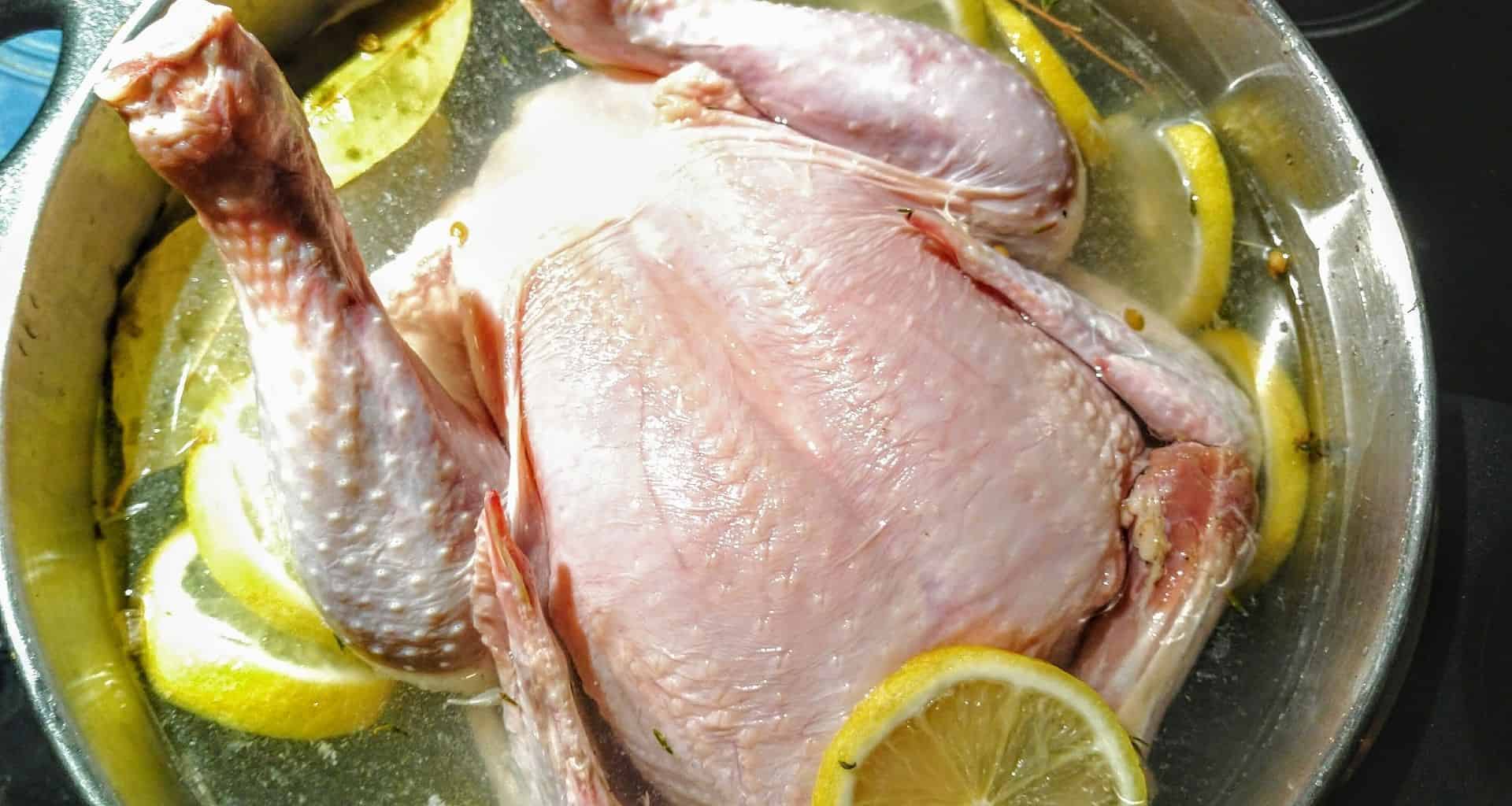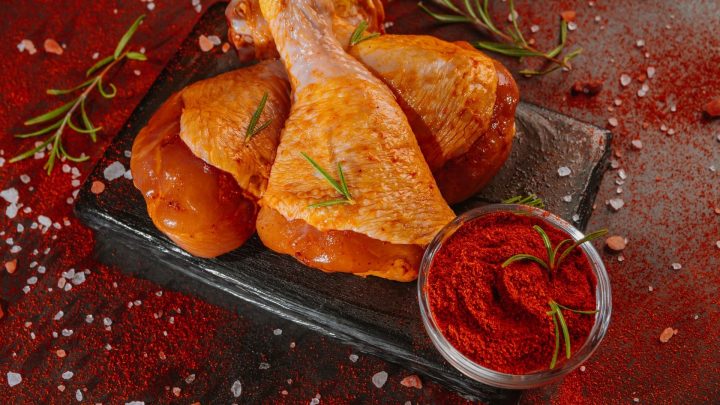Plain grilled chicken breast is a simple and healthy way to add a quality source of protein to your meal, but it can get boring after a while. That’s where marinades come to the rescue! Marinades can be a creative and tasty way to make your chicken days more flavorful.
If you’re watching your waistline, you may wonder if marinating chicken adds calories? If so, then how many? We’ll answer these questions and more, plus provide you with some delicious and nutritious marinade recipes.
As far as the first question goes, does marinating chicken add calories? The short answer is yes. Marinating chicken does add calories to the dish; however, the number of calories can be negligible depending on the ingredients you use.
For example, let’s take a simple olive oil and balsamic vinegar marinade that’s enough for four chicken breasts. One tablespoon of extra virgin oil will provide around 120 calories, and one tablespoon of balsamic vinegar will add only 14 calories, a sum of 134 calories.
Compared to a more calorie-dense buttermilk marinade that usually consists of buttermilk, sugar and butter can add 250 calories or more to the dish. So, if you’re watching your weight, you should stick to the more low-calorie marinade options that we’ll list.
Why Should You Marinate Chicken?
Marinades not only add moisture to your chicken, but if done correctly, a simple marinade is a great way to infuse lots of flavor into the meat resulting in a juicy and delicious chicken dish.
Marinades are especially beneficial when using slow cooking chicken methods because the longer you cook chicken, the more likely it is to dry out. A simple marinade can help keep your chicken breast tender and moist.
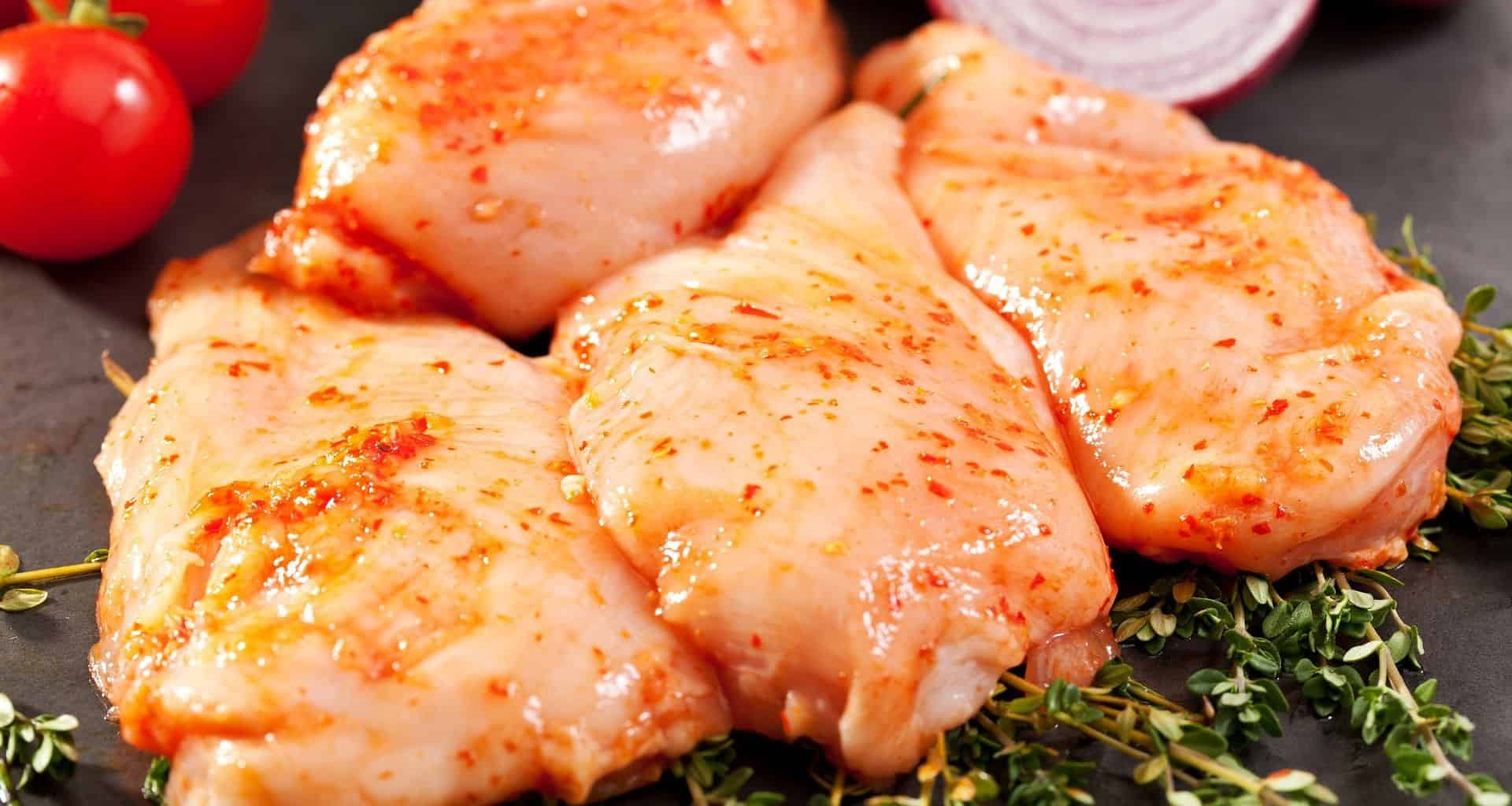
How Long Should You Marinate Chicken?
As a rule of thumb, the longer you allow the chicken to soak in the marinade, the more flavor it will absorb. However, you can over-marinate.
The duration of time you should marinate your chicken depends on the cut of the chicken and the ingredients used in the marinade. For example, acidic ingredients, like vinegar and lemon juice, will soak into meat faster than fattier ones like buttermilk or coconut milk.
Also, the smaller the chicken, the less meat it has and will require less marinating time. The same goes for chicken on the bone, which also tends to have less meat.
The chart below elaborates on marinating times for different cuts of chicken in acidic or fatty marinades.
| Chicken cut | Marinating time in acid (vinegar, lemon or lime juice, wine) | Marinating time in fat
(buttermilk, coconut milk, oil, yogurt) |
| Breast | 2-12 hours | Up to 24 hours |
| Wing | 30 minutes-2 hours | Up to 12 hours |
| Drumstick | 30 minutes-2 hours | Up to 12 hours |
| Tenderloin | 30 minutes-2 hours | Up to 12 hours |
| Thigh | 15 minutes-2 hours | Up to 12 hours |
You can slow down the marinating process by marinating in the fridge. Still, don’t marinate your chicken for more than 24 hours. The sweet spot is between 6-8 hours.
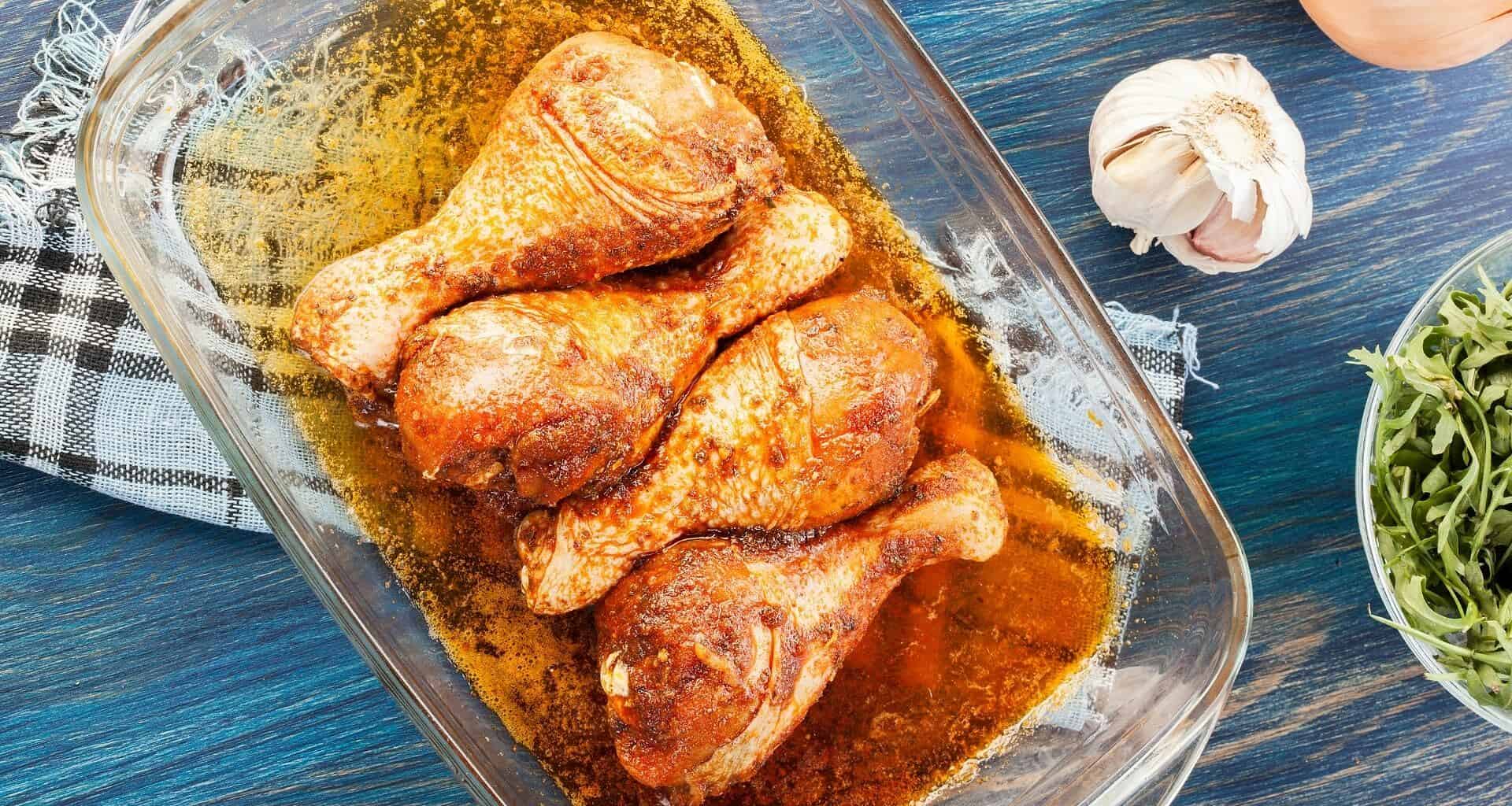
Is Marinating Chicken Healthy?
When prepared in a health-conscious way marinating chicken can add nutrition to your poultry dish. A good quality extra virgin olive oil will give you your daily dose of oleic acid and antioxidants that can help reduce inflammation in the body.
Adding fresh or dry herbs and spices to your marinades, like thyme, turmeric, or ginger, are easy ways to implement disease-fighting ingredients into your diet.
When choosing a store-bought marinade, look for those with such ingredients and less than 100-150 calories per tablespoon, preferably without added sugars, low-quality oils, or high amounts of sodium.
Another benefit of marinades is that they can help reduce the formation of cancerogenic compounds called heterocyclic amines (HCAs). When we cook animal proteins, i.e., meat, fish, and poultry, at high temperatures, especially to the point when they’re “well-done,” they form these compounds.
Something as simple as soaking the chicken in a marinade of your favorite herbs with some vinegar or lemon juice can help buffer the formation of HCAs.
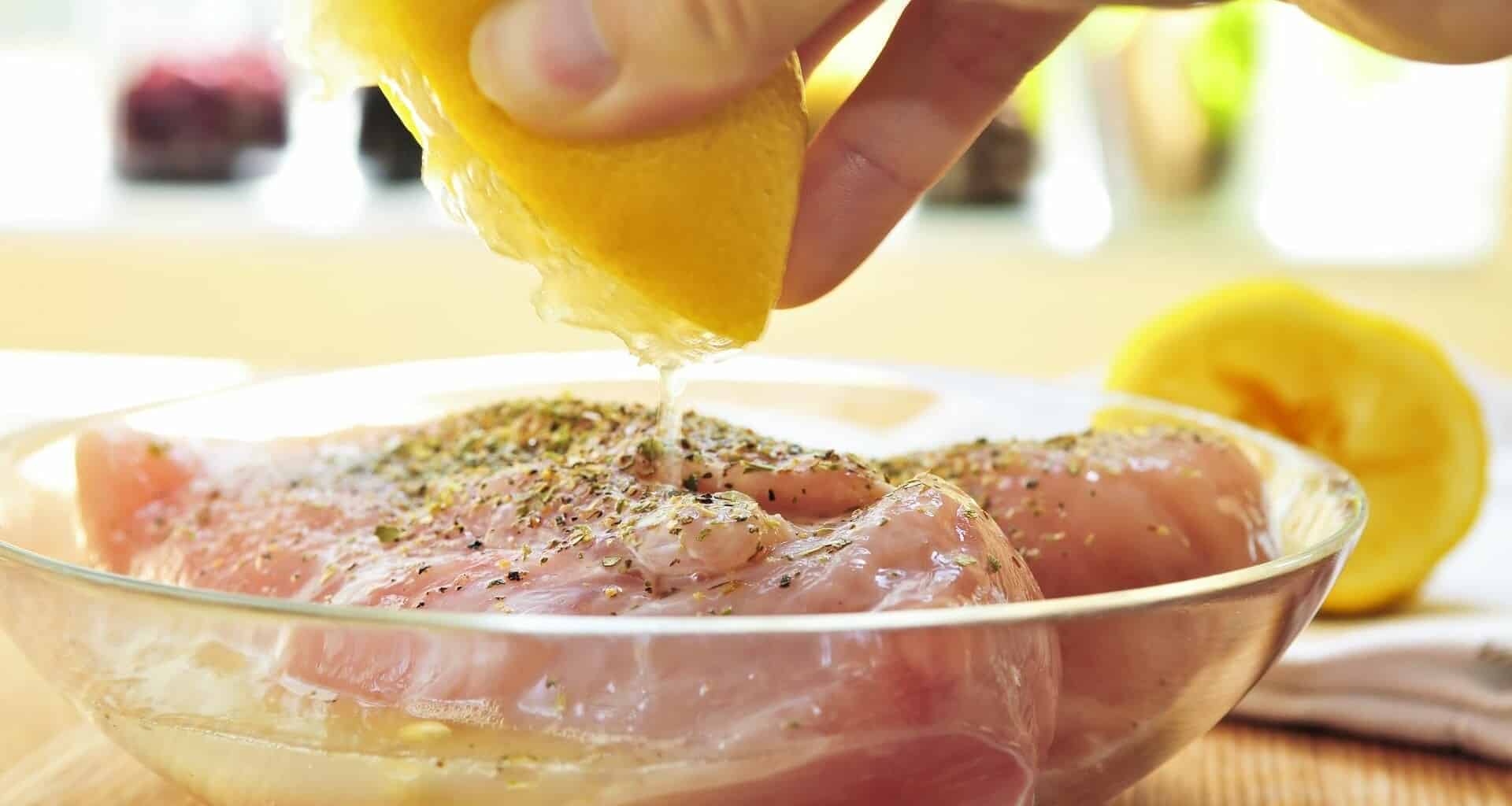
How Do You Freeze Chicken Marinades?
After preparing your marinade, you can put the raw chicken and marinade in a freezer bag and freeze it for up to 90 days. When you’re ready to use it, defrost the chicken in the fridge for up to 24 hours, then prepare it as you usually would.
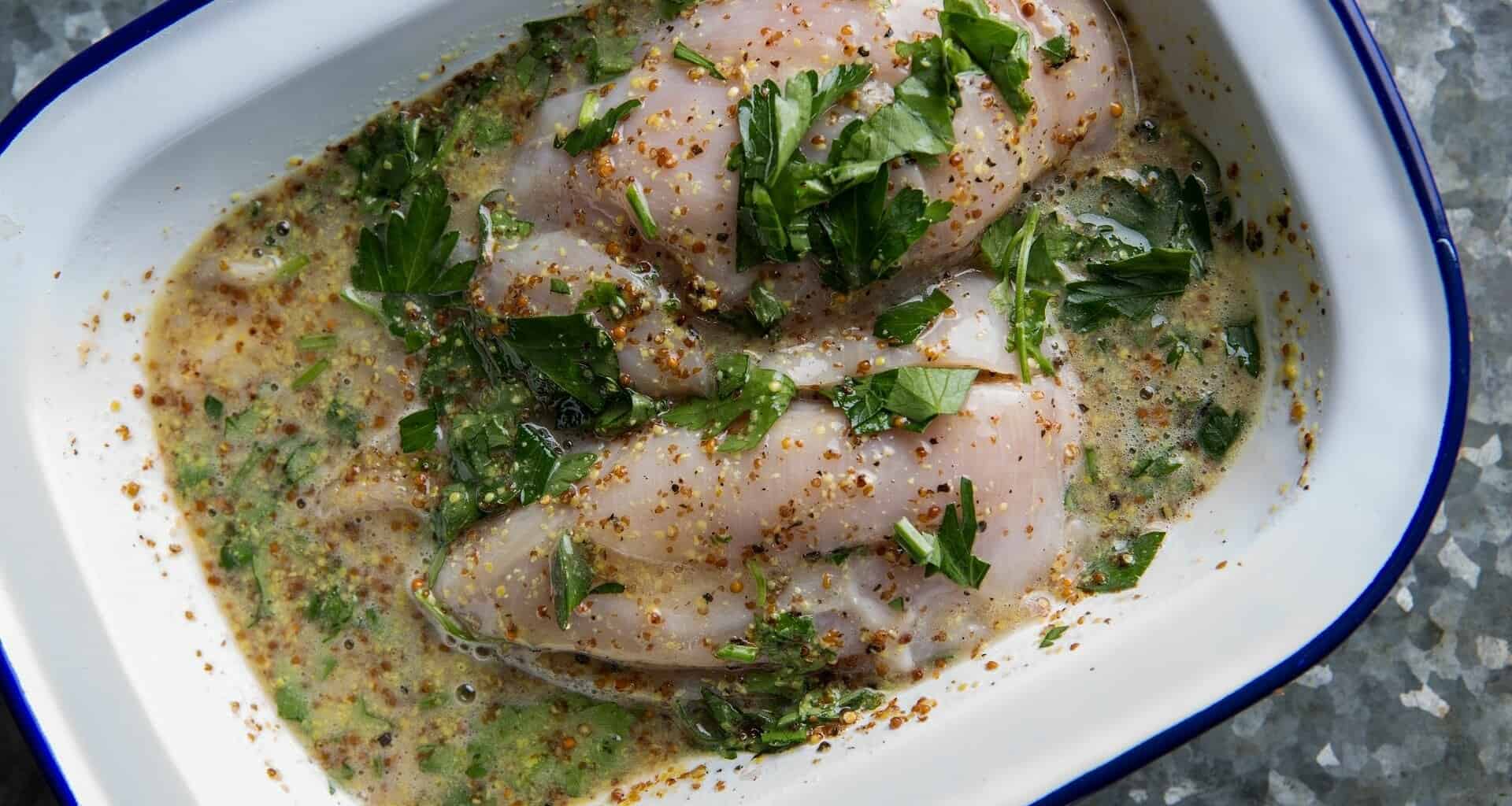
Marinade Recipes
Here are some simple low-calorie marinades you can try! The quantities of the ingredients should be enough for approximately 2lbs of chicken.
Chipotle-Lime Marinade≈ 130 calories
3/4 cup lime juice
1 chipotle chile in adobo sauce, seeded, chopped (plus 2 tsp adobo sauce)
2 tbsp chopped red onion
2 tsp vegetable oil
3 tbsp chopped cilantro (optional)
Salt and pepper to taste
Honey-Mustard Marinade≈ 150 calories
1/3 cup white wine vinegar
1/3 cup Dijon mustard
1-2 tbsps of honey
2 tsp chopped fresh thyme
2 tsp olive oil
Salt and pepper to taste
Pineapple-Ginger Marinade≈ 200 calories
1/2 cup pineapple juice
1/4 cup low-sodium soy sauce
1″ piece ginger, chopped
2 cloves garlic, chopped
1-2 tsp roasted peanut oil
How to Marinate Chicken
- Whisk all of the marinade ingredients in a small bowl.
- Put the chicken in an airtight container or freezer bag.
- Pour the marinade onto the chicken, and seal the container or bag. If you’re using a freezer bag, make sure you press out all of the air from it.
- Place the container on the lowest shelf in the refrigerator; you can turn over the chicken occasionally.
- Allow the chicken to marinate for1 to 6 hours.
Marinating Safety Tips
- It’s crucial to maintain a clean kitchen surface and wash your hands before and after handling uncooked chicken so that you avoid cross-contamination of the harmful bacteria inside the raw chicken getting on other surfaces or your hands. You don’t want to ingest it as these bacteria accidentally can make you very sick.
- Never reuse chicken marinades. Boiling the leftover marinade is not guaranteed to kill all types of bacteria that may be present, so it’s best to discard the marinade immediately after use.
Marinating is an easy and relatively low-calorie way to infuse your chicken with flavor. It also tenderizes the meat so it’s juicy and delicious. With countless ways to combine ingredients and create new marinades, the possibilities are endless!
